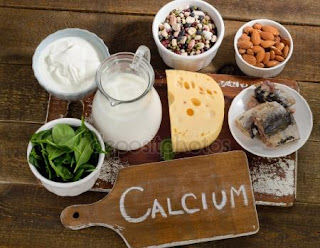How can calcium deficiency- hypocalcemia be prevented?
You can prevent calcium deficiency disease by including calcium in your diet every day. Be aware that foods high in calcium, such as dairy products, can also be high in saturated fat and trans fat. Choose low-fat or fat-free options to reduce your risk of developing high cholesterol and heart disease.
You can get 1/4 to 1/3 of your RDA of calcium in a single serving of some milk and yogurts. According to the United States Department of Agriculture (USDA), other calcium-rich foods include:
Food Approximate serving size Amount of calcium per serving
Sardines (in oil) 3.75 oz. 351 mg
Salmon (pink, canned, with bones) 3 oz. 183 mg
Fortified tofu (regular, not firm) 1/3 cup 434 mg
Edamame (frozen) 1 cup 71–98 mg
White beans 1 cup 161 mg
Collard greens (cooked) 1 cup 268 mg
Broccoli (cooked) 1 cup 62 mg
Figs (dried) 5 figs 68 mg
Fortified orange juice 1 cup 364 mg
Wheat bread 1 slice 36 mg
While meeting your calcium requirement is very important, you also want to make sure you’re not getting too much. According to the Mayo Clinic, upper limits of calcium intake in milligrams (mg) for adults are:
2,000 mg per day for men and women 51 years of age and up
2,500 mg per day for men and women 19 to 50 years of age
You might want to supplement your diet by taking a multivitamin. Or your doctor may recommend supplements if you’re at high risk for developing a calcium deficiency.
Multivitamins may not contain all of the calcium you need, so be sure to eat a well-rounded diet. If you’re pregnant, take a prenatal vitamin.
Vitamin D -Vitamin D is important because it increases the rate calcium is absorbed into your blood. Ask your doctor how much vitamin D you need.
To increase your calcium intake, you can add food rich in vitamin D to your diet. These include:
fatty fish like salmon and tuna
fortified orange juice
Fortified milk
portobello mushrooms
eggs
As with calcium-rich dairy products, some vitamin D-rich dairy products can also be high in saturated fat. Sunlight triggers your body to make vitamin D, so getting regular exposure to the sun can also help boost your vitamin D levels.
Lifestyle changes to prevent calcium deficiency
In addition to maintaining healthy calcium and vitamin D levels, there are certain lifestyle changes you can make to promote bone health. These include:
Maintaining a healthy body weight
Exercising regularly
Restricting tobacco use and alcohol intake
Complications of calcium deficiency?
Complications from calcium deficiency disease include eye damage, an abnormal heartbeat, and osteoporosis.
· Complications from osteoporosis include:
· disability
· spinal fractures or other bone fractures
· difficulty walking
If left untreated, calcium deficiency disease could eventually be fatal.
How’s calcium deficiency treated?
Calcium deficiency is usually easy to treat. It typically involves adding more calcium to your diet and maintaining a good level of Vitamin D for absorption of calcium in the body. Do not self-treat by taking a lot of calcium supplements. Taking more than the recommended dose without your doctor’s approval can lead to serious issues like kidney stones.
* 12 Calcium-Rich Foods
* 12 Calcium-Rich Foods
Commonly recommended calcium supplements include:
Calcium carbonate, which is the least expensive and has the most elemental calcium
Calcium citrate, which is the most easily absorbed
Calcium phosphate, which is also easily absorbed and doesn’t cause constipation
Calcium supplements are available in liquid, tablet, and chewable forms.
It’s important to note that some medications could interact negatively with calcium supplements. These medications include:
Blood pressure beta-blockers like atenolol, which may decrease calcium absorption if taken within two hours of taking calcium supplements
Antacids containing aluminum, which may increase blood levels of aluminum
Cholesterol-lowering bile acid sequestrants such as colestipol, which may decrease calcium absorption and increase the loss of calcium in the urine
Estrogen medications, which can contribute to an increase in calcium blood levels
digoxin, as high calcium levels can increase digoxin toxicity
Diuretics, which can either increase calcium levels (hydrochlorothiazide) or decrease calcium levels in the blood (furosemide)
Certain antibiotics such as fluoroquinolones and tetracyclines, whose absorption can be decreased by calcium supplements
Sometimes diet changes and supplements aren’t enough to treat a calcium deficiency. In this case, your doctor may want to regulate your calcium levels by giving you regular calcium injections.
You can expect to see results within the first few weeks of treatment. Severe cases of calcium deficiency disease will be monitored at one- to three-month intervals.








